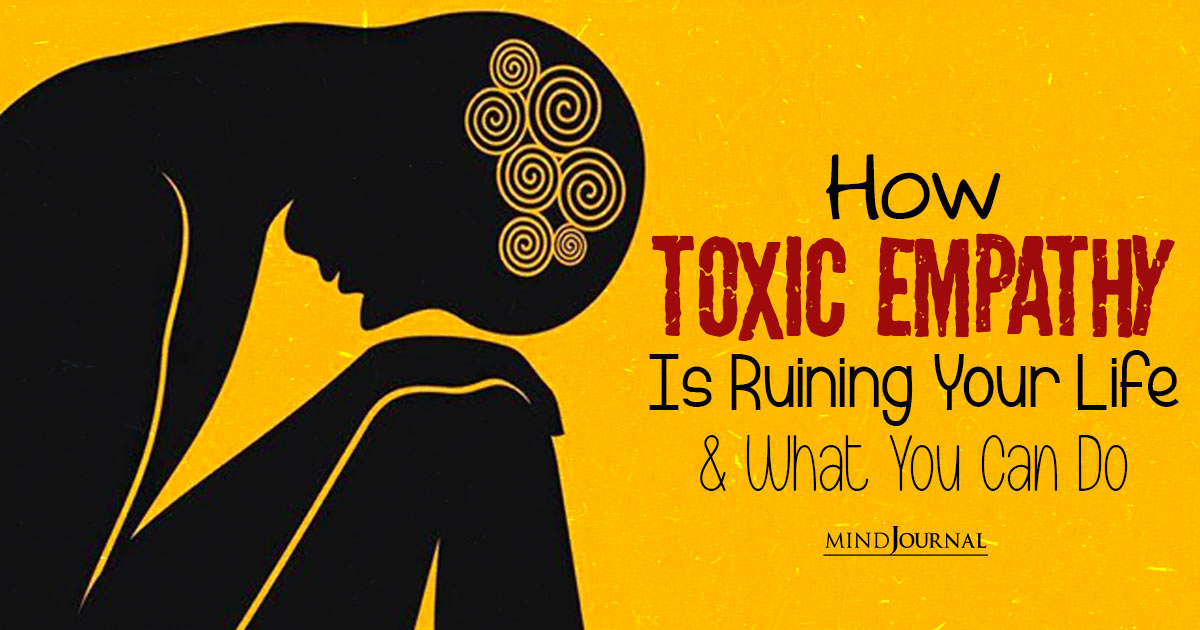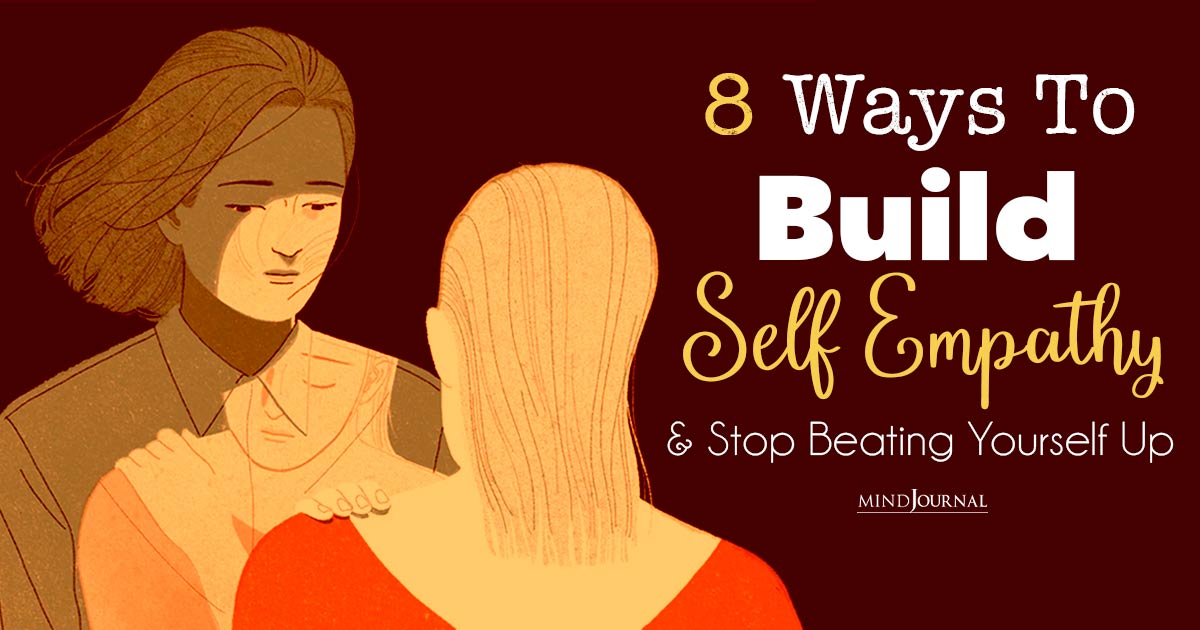Have you ever wondered why some people seem to be overly sensitive and emotionally drained by the problems of others? Can too much empathy be harmful? Is there such a thing as toxic empathy?
While empathy is considered a valuable trait that promotes understanding and compassion, there is a lesser-known phenomenon called toxic empathy that can have detrimental effects on both the empath and those around them.
Today, let us explore what is toxic empathy disorder, what causes toxic empathy, can too much empathy be a bad thing, and learn strategies to deal with it.
What is Toxic Empathy?
Empathy, in its essence, is the ability to understand and share the feelings of others. It allows us to connect on a deeper level, offering comfort and support.
However, toxic empathy takes this natural inclination to an extreme, where individuals become overwhelmed by the emotions of others to the point where it negatively affects their own lives and relationships.
It is characterized by an excessive and unhealthy preoccupation with other people’s problems, often at the expense of one’s own mental and emotional well-being.
Related: The Difference Between Empathy And Sympathy: Mastering The Jedi Mind Tricks of Emotional Bonding
Toxic Empathy Disorder: When Empathy Becomes a Burden

Toxic empathy can manifest as a disorder known as Toxic Empathy Disorder (TED), which occurs when the empathic tendencies of an individual become unbalanced and detrimental.
People with TED may find it challenging to set boundaries, leading to a constant state of emotional exhaustion, anxiety, and even depression. They may also exhibit signs of codependency, as they prioritize the needs of others over their own.
However, it should be noted that it is not an officially recognized psychological or medical term. The term is mainly used colloquially to describe unhealthy patterns of empathy.
What Causes Toxic Empathy? 3 Factors to Consider
While we have a better understanding of what is toxic empathy, analyzing the factors that contribute to unhealthy levels of empathy can help us better manage our empathy levels. Here’s what causes toxic empathy –
1. Childhood Experiences
Toxic empathy can be rooted in early childhood experiences, such as growing up in an environment where emotions were invalidated or where one was constantly exposed to the distress of others without proper support.
Studies show that “adults who reported experiencing a traumatic event in childhood had elevated empathy levels compared to adults who did not experience a traumatic event.”
2. Personal Trauma
Individuals who have experienced trauma themselves may develop a heightened sensitivity to the suffering of others as a way to cope with their own pain. This can lead to an overextension of empathy, resulting in toxic empathy.
3. Social Conditioning
Society often celebrates selflessness and empathy, which can inadvertently reinforce toxic empathy. The constant pressure to be “good” and “helpful” can drive individuals to neglect their own needs and well-being.
Related: What Is Empathetic Listening? 9 Tips To Master The Power Of Understanding In Communication
What Toxic Empathy in Relationships Look Like
Toxic empathy in relationships can lead to emotional burnout, codependency, and enabling behavior. It may lead to resentment, imbalance, and ultimately, erosion of trust and intimacy between partners.
Let’s take a closer look at toxic empathy in relationships –
1. Emotional Burnout
Empaths who exhibit toxic empathy often find themselves emotionally drained due to constantly absorbing the emotions of others. This can lead to burnout and a decreased ability to provide genuine support in relationships.
2. Codependency
Toxic empathy can contribute to codependent dynamics in relationships, where one person becomes excessively reliant on the empath for emotional validation and support. This can create an unhealthy and imbalanced dynamic that hinders personal growth and self-sufficiency.
3. Loss of Identity
Empaths with toxic empathy may struggle to establish and maintain healthy boundaries, often sacrificing their own needs and desires to meet the expectations of others. Over time, this can lead to a loss of personal identity and a diminished sense of self.
Although empathy is essential for understanding and supporting others, toxic empathy involves sacrificing one’s own well-being and boundaries. Addressing toxic empathy requires setting healthy boundaries, practicing self-care, and fostering balanced relationships based on mutual respect and support.

Can Too Much Empathy Be a Bad Thing?
While empathy is generally considered a positive trait, excessive empathy can have negative consequences. Here are a few potential downsides of too much empathy:
1. Emotional Exhaustion
Constantly absorbing and carrying the emotional burdens of others can lead to emotional exhaustion and, eventually, compassion fatigue.
2. Lack of Self-Care
Empaths with toxic empathy may neglect their own self-care and well-being, as they are overly focused on meeting the needs of others. This can lead to deteriorating physical and mental health.
3. Impaired Decision-Making
Excessive empathy can cloud one’s judgment and hinder their ability to make decisions that prioritize their own best interests. This can lead to a cycle of enabling unhealthy behaviors in others.
Related: 5 Strategies To Empathize Without Absorbing Emotions And Stress
What are Some Strategies for Dealing with Toxic Empathy?
When dealing with toxic empathy, setting healthy boundaries is crucial for protecting your own well-being while still maintaining empathy and compassion.
Here are some strategies to help you establish and maintain those boundaries:
1. Self-Awareness
Start by developing a deep understanding of your own emotions, needs, and limitations. Take the time to reflect on how you feel in different situations and identify the signs of emotional exhaustion or overwhelm.
This self-awareness will allow you to recognize when you are crossing your own boundaries.
2. Practice Self-Care
Prioritize self-care activities that replenish your energy and nurture your own well-being. Engage in activities that bring you joy, relaxation, and rejuvenation. This could include hobbies, exercise, spending time in nature, or simply taking quiet moments for yourself.
3. Set Clear Limits
Clearly communicate your boundaries to the people around you. Let them know what you are comfortable with and what you need in terms of emotional support and involvement.
Be assertive and firm in expressing your limits, even if it feels uncomfortable. Remember, setting boundaries is necessary for your own mental and emotional health.
4. Learn to Say No
It’s important to recognize that saying “no” is not a sign of selfishness or lack of empathy. It is a way to protect your own well-being and ensure that you are not taking on more than you can handle.
Practice saying no when you feel overwhelmed or when a request exceeds your capabilities. You have the right to prioritize your own needs.
5. Seek Professional Help
If toxic empathy disorder continues to significantly impact your well-being and relationships, consider seeking professional help from a therapist or counselor. They can provide you with valuable guidance and strategies tailored to your specific situation.
By prioritizing your well-being and setting healthy boundaries, you can maintain empathy while protecting yourself from the negative effects of toxic empathy.

Takeaway
While empathy is undoubtedly a powerful and valuable trait, it is essential to recognize the potential pitfalls of toxic empathy. Understanding the causes and effects of toxic empathy can help individuals strike a balance between compassion for others and self-care.
By setting healthy boundaries, seeking support when needed, and practicing self-compassion, individuals can navigate the complex landscape of empathy in a way that promotes both personal well-being and genuine connection with others.
Related: The Healing Power: How Empathy Boosts Your Immune System
Frequently Asked Questions (FAQs):
Is having too much empathy a disorder?
Having too much empathy isn’t a disorder, but excessive empathy can lead to difficulties in setting boundaries and self-care.
What is hyper-empathy syndrome?
Hyper-empathy syndrome is an unofficial term describing individuals who experience intense levels of empathy and emotional sensitivity.
How do you deal with toxic empaths?
Dealing with toxic empaths involves setting clear boundaries, practicing assertiveness, and encouraging them to prioritize their own well-being.










Leave a Reply